
osTicket is an open source help desk management solution that offers ticket management and IT asset management within a suite. The system can be deployed on your Synology NAS and is suited for small and midsize enterprise customers. In this step by step guide I will show you how to install osTicket on your Synology NAS using Docker & Portainer.
STEP 1
Please Support My work by Making a Donation.
STEP 2
Install Portainer using my step by step guide. If you already have Portainer installed on your Synology NAS, skip this STEP. Attention: Make sure you have installed the latest Portainer version.
STEP 3
Make sure you have a synology.me Wildcard Certificate. Follow my guide to get a Wildcard Certificate. If you already have a synology.me Wildcard certificate, skip this STEP.
STEP 4
Go to Control Panel / Login Portal / Advanced Tab / click Reverse Proxy. Follow the instructions in the image below.
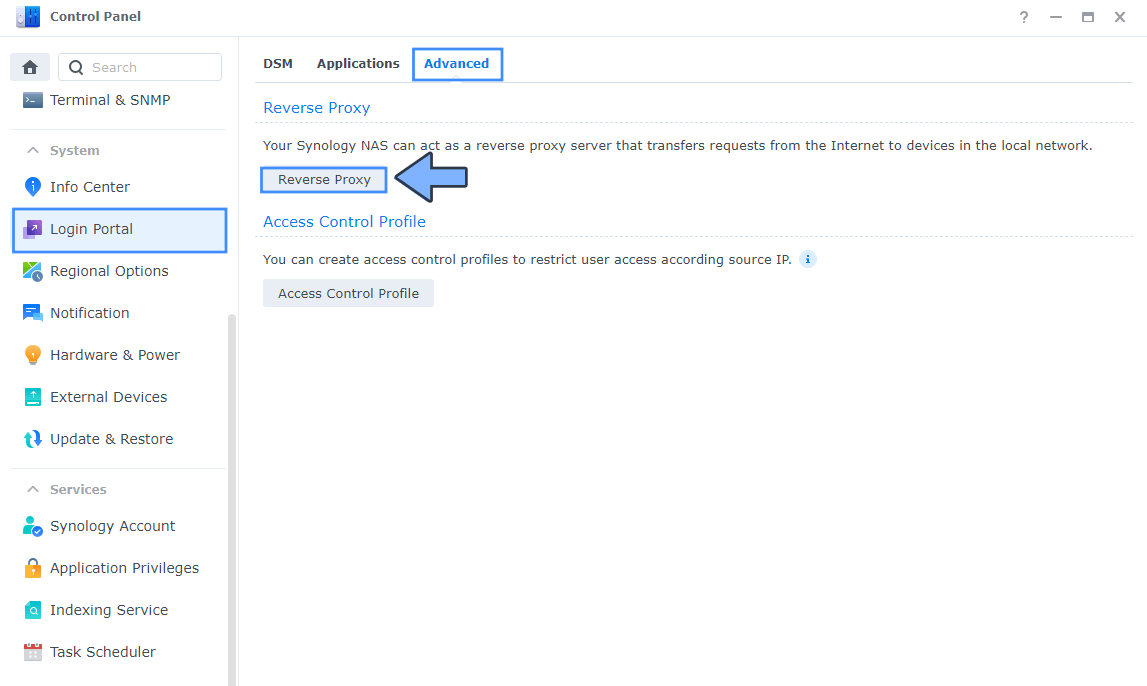
STEP 5
Now click the “Create” button. Follow the instructions in the image below.
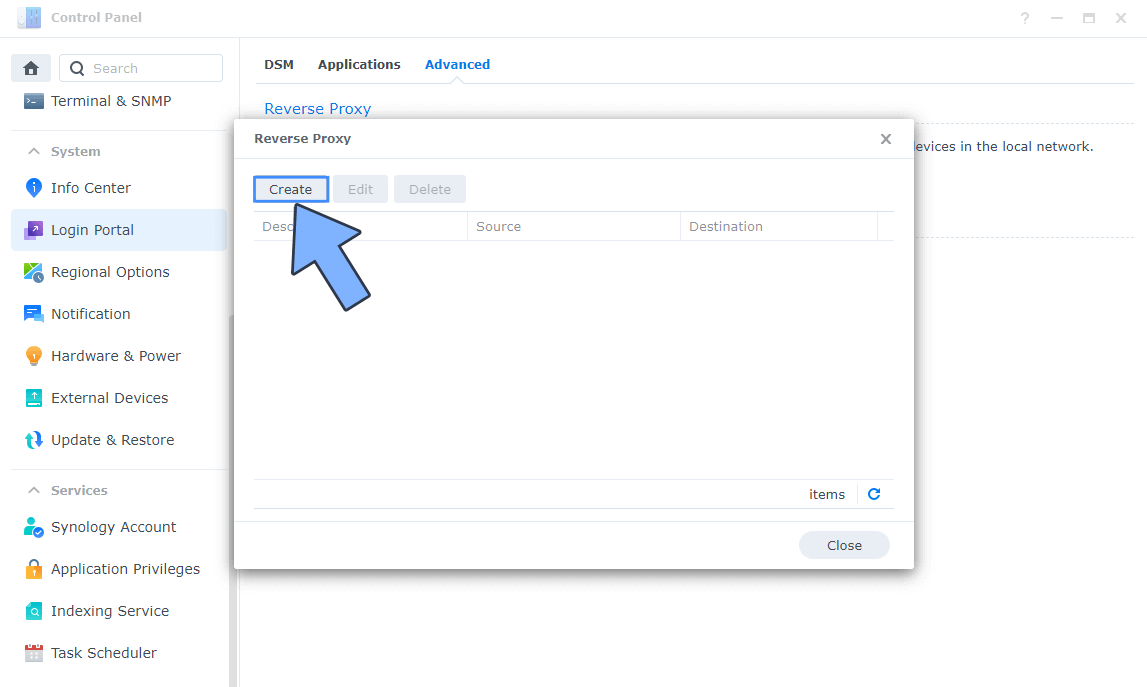
STEP 6
After you click the Create button, the window below will open. Follow the instructions in the image below.
On the General area, set the Reverse Proxy Name description: type in osTicket. After that, add the following instructions:
Source:
Protocol: HTTPS
Hostname: osticket.yourname.synology.me
Port: 443
Check Enable HSTS
Destination:
Protocol: HTTP
Hostname: localhost
Port: 6784
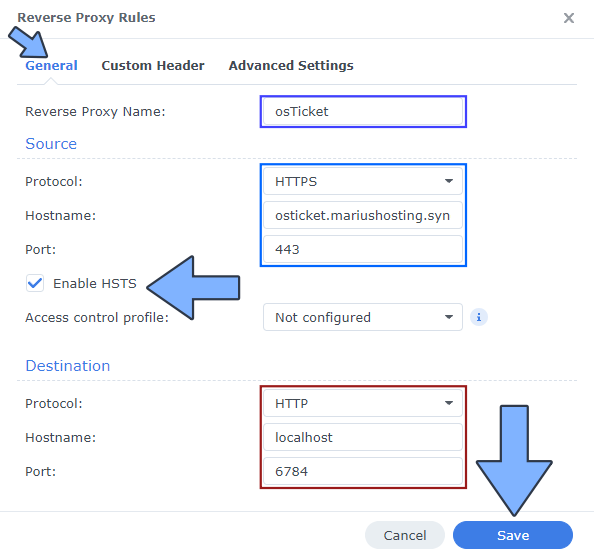
STEP 7
On the Reverse Proxy Rules click the Custom Header tab. Click Create and then, from the drop-down menu, click WebSocket. After you click on WebSocket, two Header Names and two Values will be automatically added. Click Save. Follow the instructions in the image below.

STEP 8
Go to Control Panel / Network / Connectivity tab/ Check Enable HTTP/2 then click Apply. Follow the instructions in the image below.
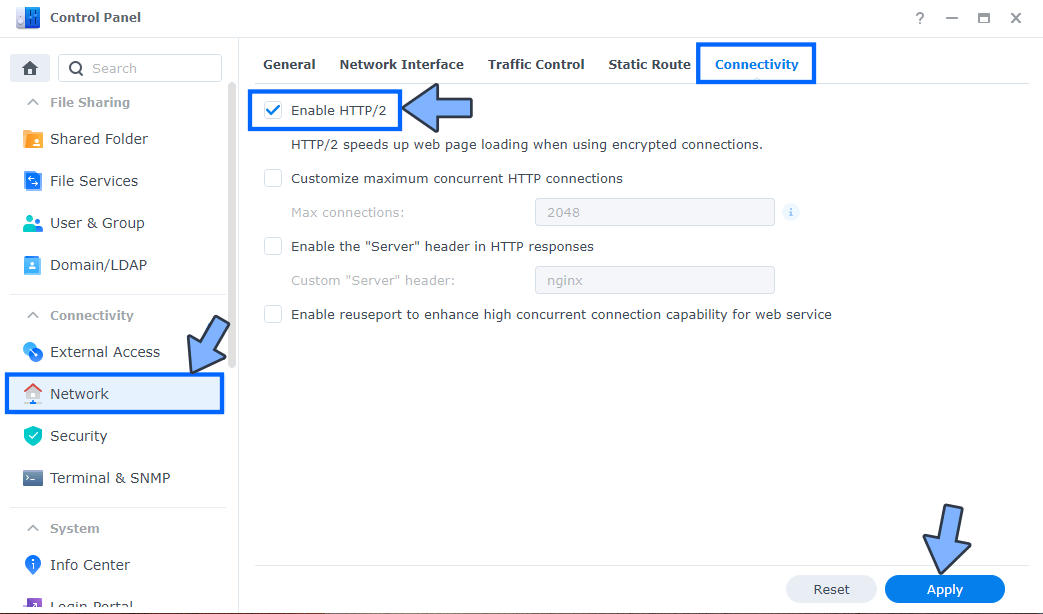
STEP 9
Go to Control Panel / Security / Advanced tab/ Check Enable HTTP Compression then click Apply. Follow the instructions in the image below.
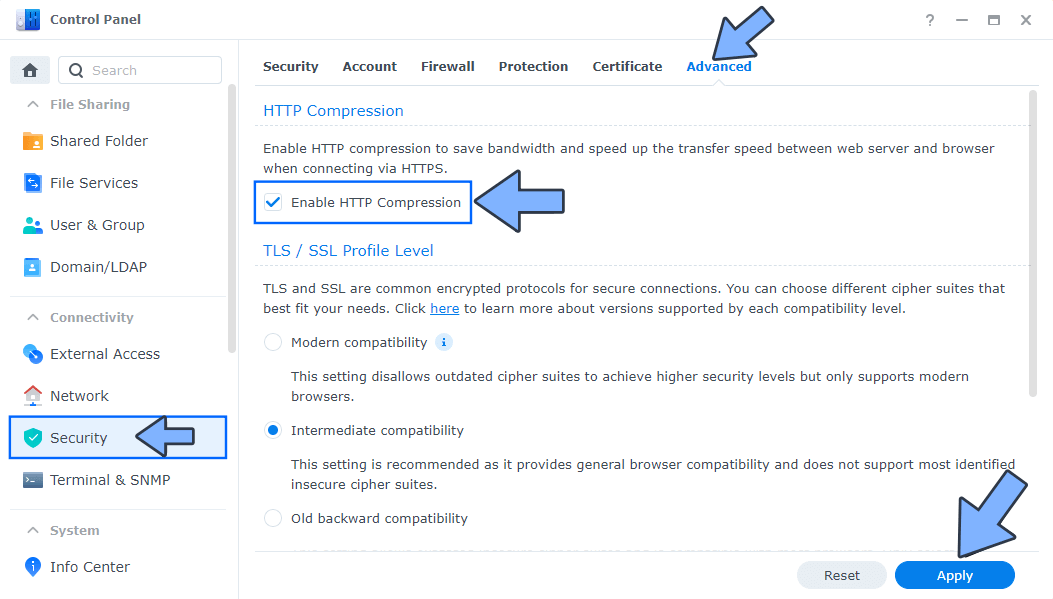
STEP 10
Go to File Station and open the docker folder. Inside the docker folder, create one new folder and name it osticket. Follow the instructions in the image below.
Note: Be careful to enter only lowercase, not uppercase letters.
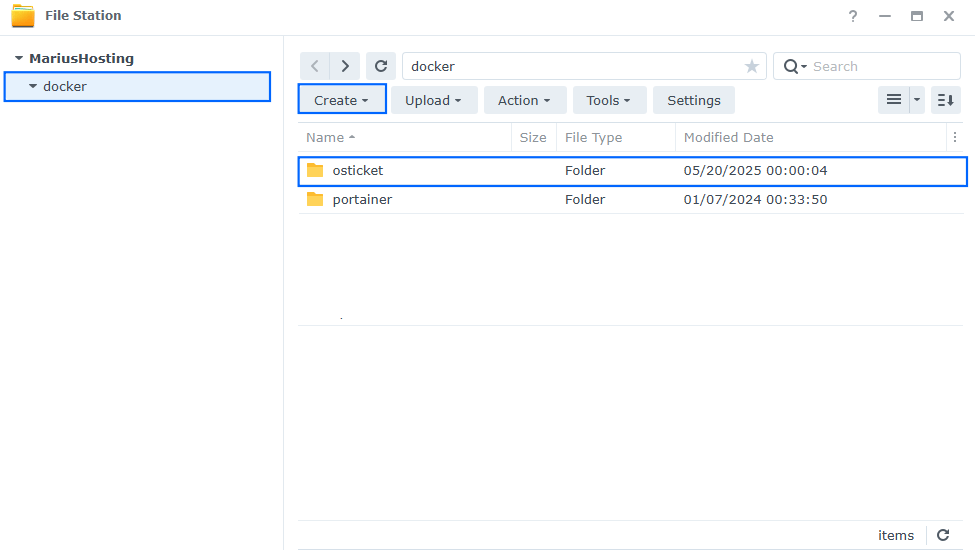
STEP 11
Now create two new folders inside the osticket folder that you have previously created at STEP 10, and name them data and db. Follow the instructions in the image below.
Note: Be careful to enter only lowercase, not uppercase letters.
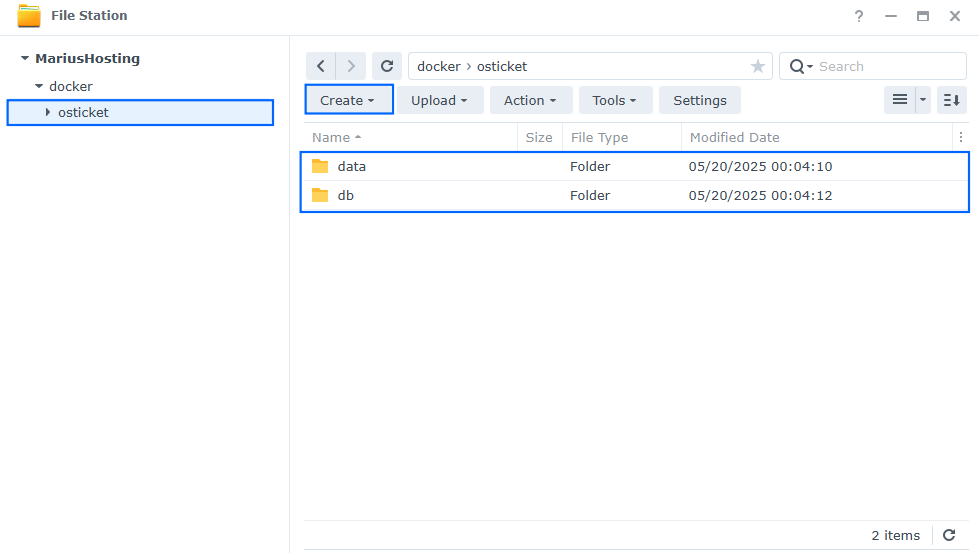
STEP 12
Follow my step by step guide on how to activate SMTP for your Gmail account. This step is mandatory. Note: If you don’t want to use the easiest way for SMTP with Google and you already have SMTP details from your own Mail Server, you can just skip this STEP and use your personalized email SMTP details instead.
STEP 13
Log into Portainer using your username and password. On the left sidebar in Portainer, click on Home then Live connect. Follow the instructions in the image below.

On the left sidebar in Portainer, click on Stacks then + Add stack. Follow the instructions in the image below.

STEP 14
In the Name field type in osticket. Follow the instructions in the image below.
services:
db:
image: mysql:8
container_name: OsTicket-DB
hostname: db
security_opt:
- no-new-privileges:true
healthcheck:
test: mysqladmin -p$$MYSQL_ROOT_PASSWORD ping -h localhost
interval: 20s
start_period: 10s
timeout: 10s
retries: 3
environment:
MYSQL_ROOT_PASSWORD: superpassword
MYSQL_DATABASE: osticket
MYSQL_USER: osticketuser
MYSQL_PASSWORD: osticketpass
volumes:
- /volume1/docker/osticket/db:/var/lib/mysql:rw
restart: on-failure:5
osticket:
image: rinkp/osticket-dockerized:main
container_name: OsTicket
healthcheck:
test: ["CMD-SHELL", "nc -z 127.0.0.1 80 || exit 1"]
interval: 10s
timeout: 5s
retries: 3
start_period: 90s
ports:
- 6784:80
depends_on:
db:
condition: service_healthy
environment:
OST_DBUSER: osticketuser
OST_DBPASS: osticketpass
OST_DBTYPE: mysql
OST_DBNAME: osticket
OST_DBHOST: db
OST_SESSION_BACKEND: db
OST_TRUSTED_PROXIES: "*"
OST_SESSION_SESSID: OSTSESSID
PHP_OPCACHE_MAX_ACCELERATED_FILES: 16229 #The maximum number of files in the cache.
PHP_OPCACHE_MEMORY_CONSUMPTION: 384 #The amount of memory (in MB) that can be used by 'opcache'.
PHP_OPCACHE_MAX_WASTED_PERCENTAGE: 10 #The maximum percentage of wasted memory before 'opcache' is cleared.
OST_SECRET_SALT: dOxZYTTZgXKMHkqLBIQVImayQXAVWdzGBPuFJKggzcgvgPJPXpWzqzKaUOIOGGIr
OST_ADMIN_EMAIL: your@ownemail
OST_ADMIN_PASSWD: mariushosting
volumes:
- /volume1/docker/osticket/data:/var/www/attachments:rw
postfix:
image: juanluisbaptiste/postfix:latest
hostname: osticket-postfix
container_name: OsTicket-SMTP
environment:
SMTP_SERVER: smtp.gmail.com
SMTP_USERNAME: Your-own-gmail-address
SMTP_PASSWORD: Your-own-app-password
SMTP_PORT: 587
SERVER_HOSTNAME: osticket-postfix
depends_on:
- db
- osticket
restart: on-failure:5
Note: Before you paste the code above in the Web editor area below, change the value for OST_SECRET_SALT. (Generate your own Random 64 length OST_SECRET_SALT.)
Note: Before you paste the code above in the Web editor area below, change the value for OST_ADMIN_EMAIL and type in your own Email Address. You will need this Email Address later at STEP 18.
Note: Before you paste the code above in the Web editor area below, change the value for OST_ADMIN_PASSWD and type in your own password. mariushosting is an example for a password. You will need this Password later at STEP 18.
Note: Before you paste the code above in the Web editor area below, change the value for SMTP_USERNAME and type in your own Gmail address. STEP 12.
Note: Before you paste the code above in the Web editor area below, change the value for SMTP_PASSWORD and type in your own Gmail address. STEP 12.
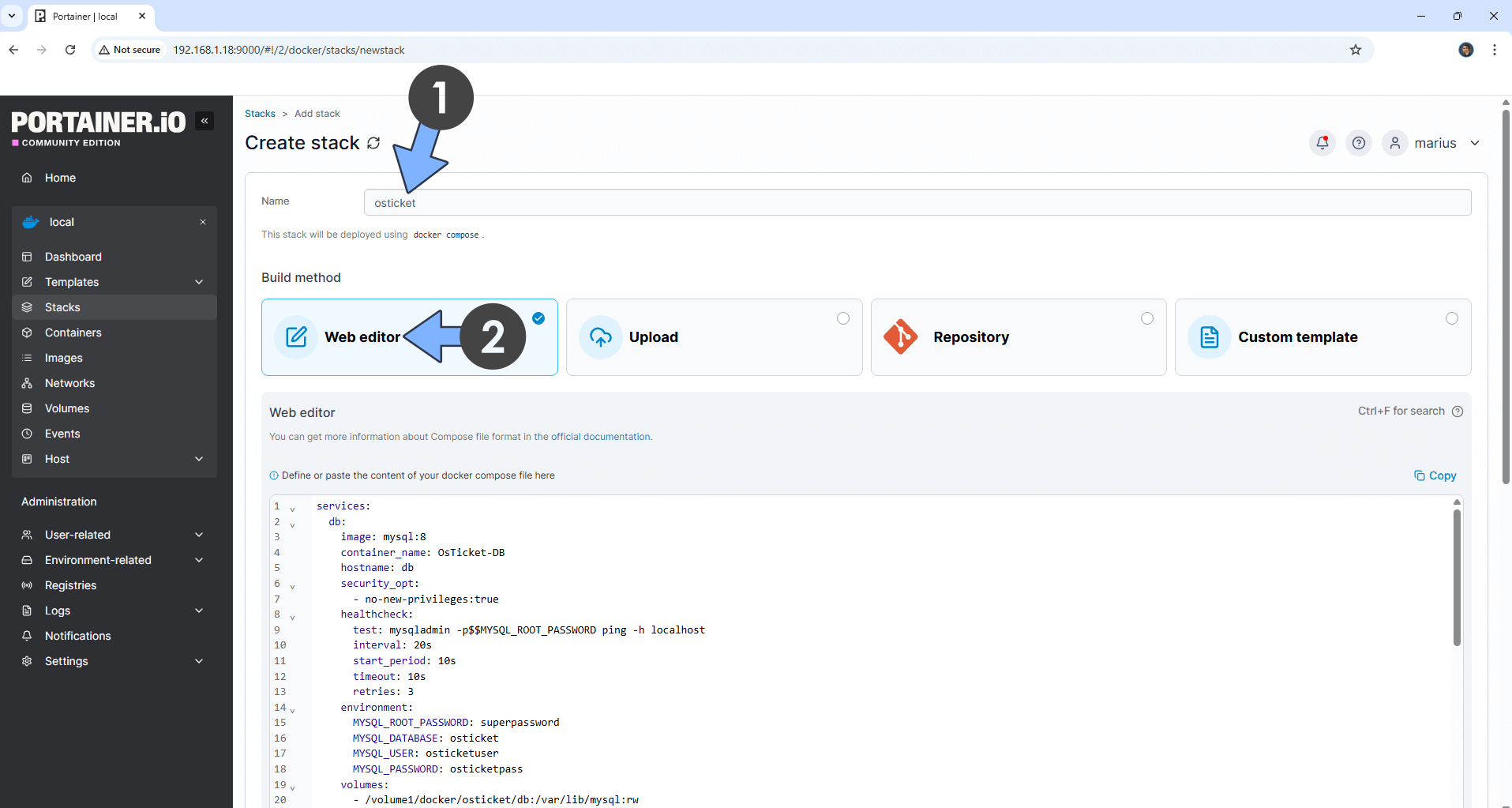
STEP 15
Scroll down on the page until you see a button named Deploy the stack. Click on it. Follow the instructions in the image below. The installation process can take up to a few minutes. It will depend on your Internet speed connection.
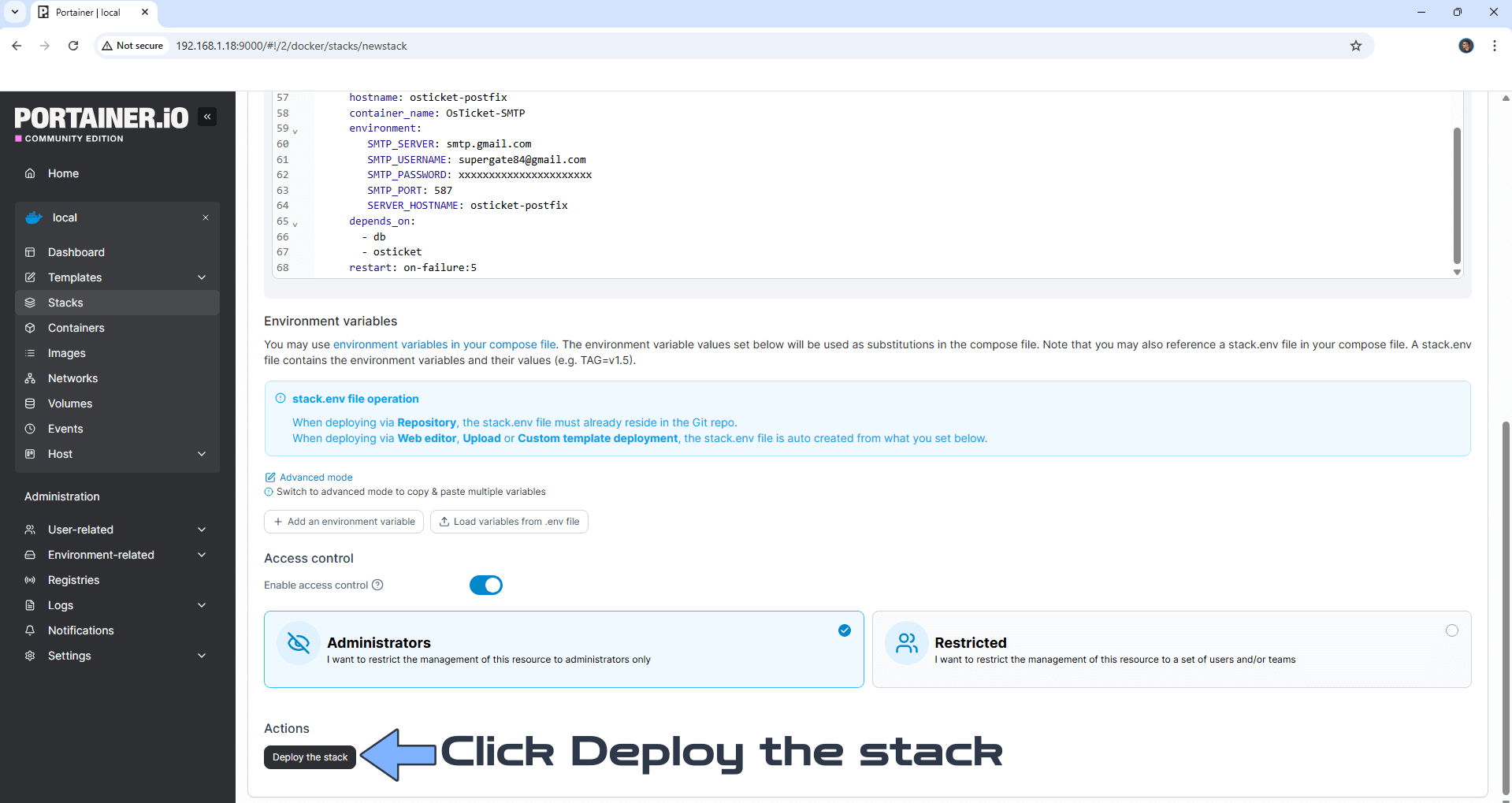
STEP 16
If everything goes right, you will see the following message at the top right of your screen: “Success Stack successfully deployed“.

STEP 17
🟢Please Support My work by Making a Donation. Almost 99,9% of the people that install something using my guides forget to support my work, or just ignore STEP 1. I’ve been very honest about this aspect of my work since the beginning: I don’t run any ADS, I don’t require subscriptions, paid or otherwise, I don’t collect IPs, emails, and I don’t have any referral links from Amazon or other merchants. I also don’t have any POP-UPs or COOKIES. I have repeatedly been told over the years how much I have contributed to the community. It’s something I love doing and have been honest about my passion since the beginning. But I also Need The Community to Support me Back to be able to continue doing this work.
STEP 18
The installation process can take up to a few seconds/minutes. Please wait approximately 2 minutes or you will get a blank synology error page if you try to connect too soon. Now open your browser and type in your HTTPS/SSL certificate like this https://osticket.yourname.synology.me/scp/login.php In my case it’s https://osticket.mariushosting.synology.me/scp/login.php If everything goes right, you will see the osTicket Admin Login page. Type in your own Email Address (OST_ADMIN_EMAIL) and your own Password (OST_ADMIN_PASSWD) that you have previously added at STEP 14, then click Log In. Follow the instructions in the image below.
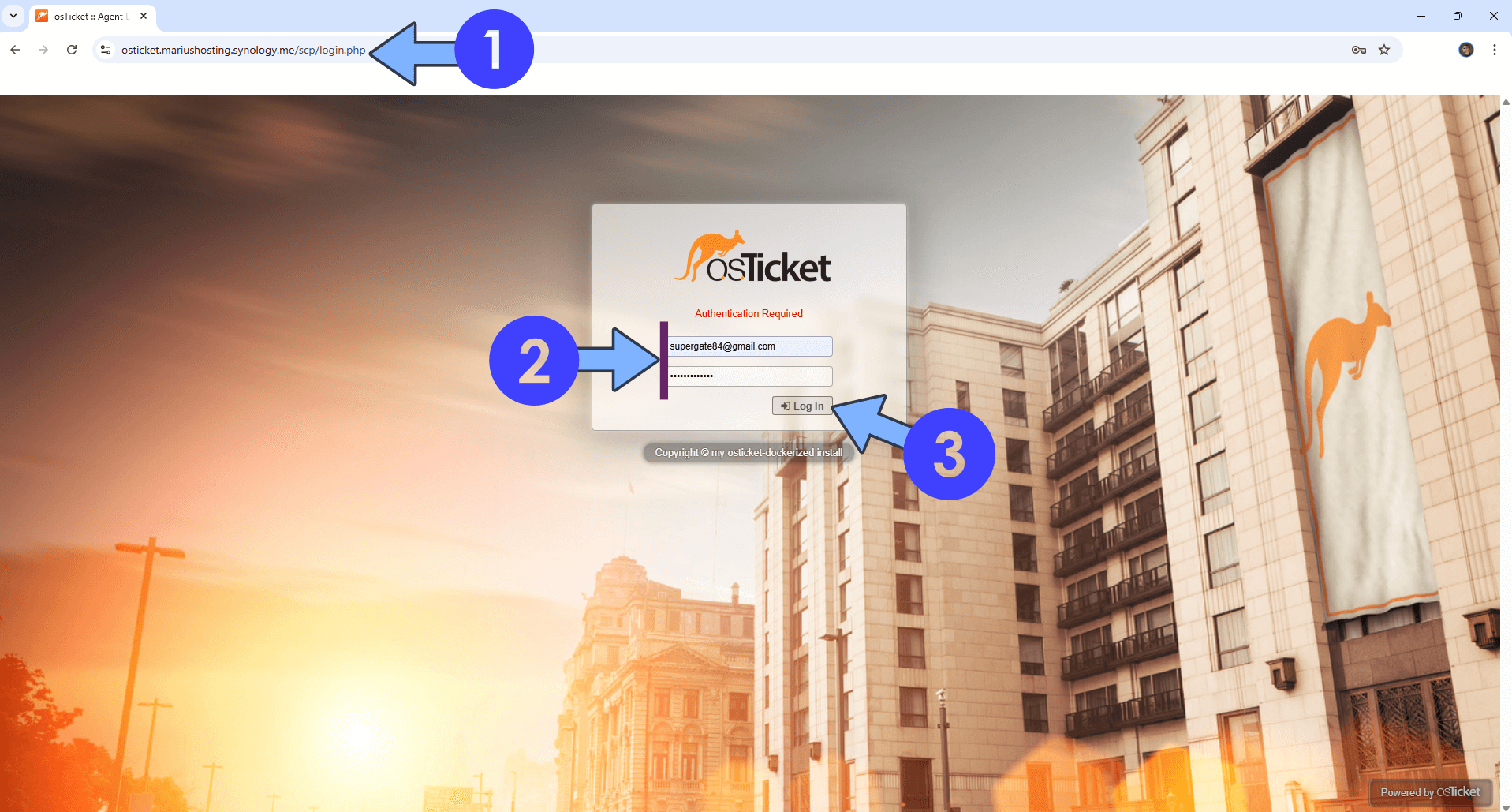
STEP 19
You will be prompted to change your current Password. Type in your new password, then click Update. Follow the instructions in the image below.
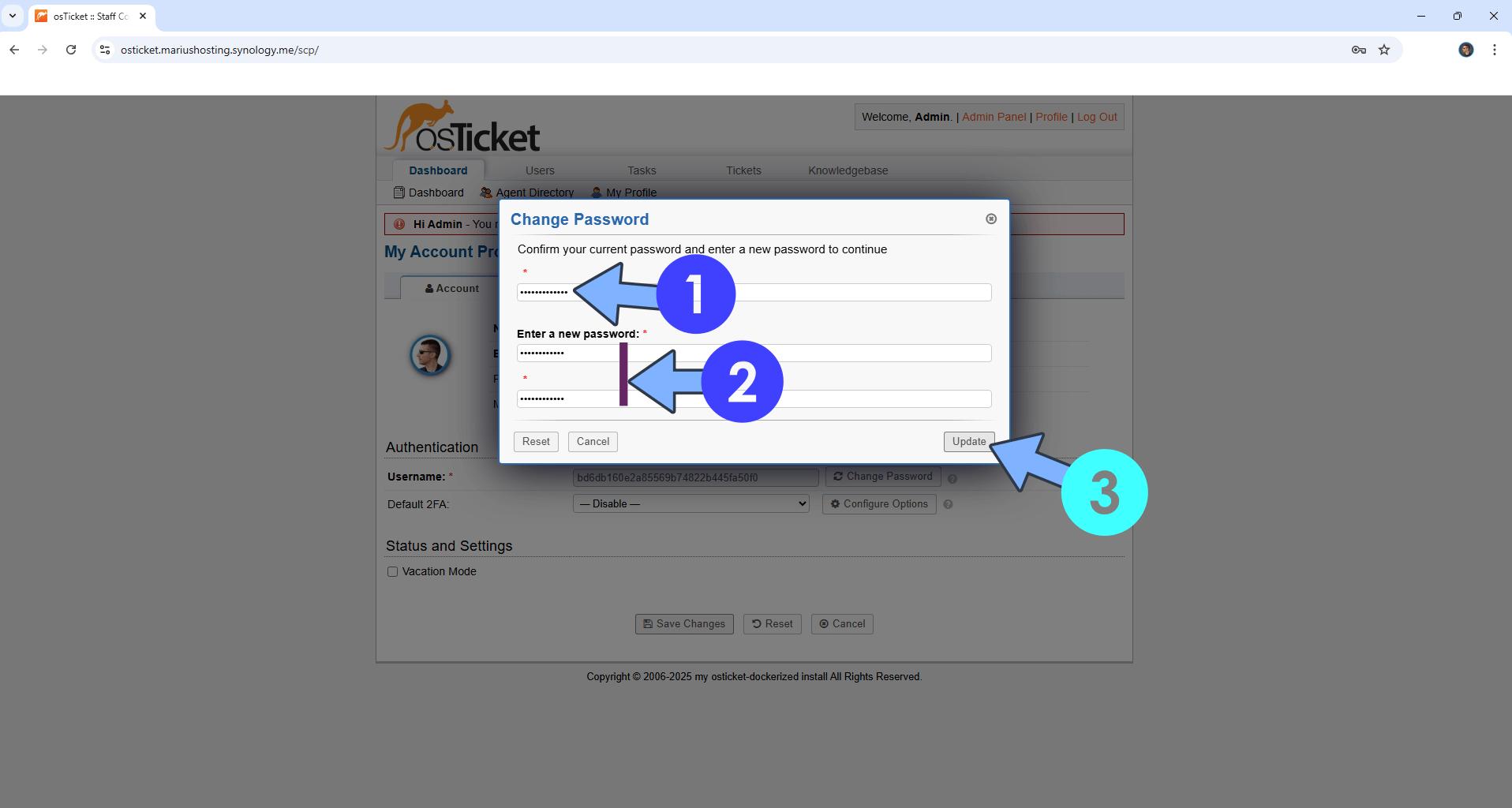
STEP 20
At the top right of the page, click Log Out. Follow the instructions in the image below.
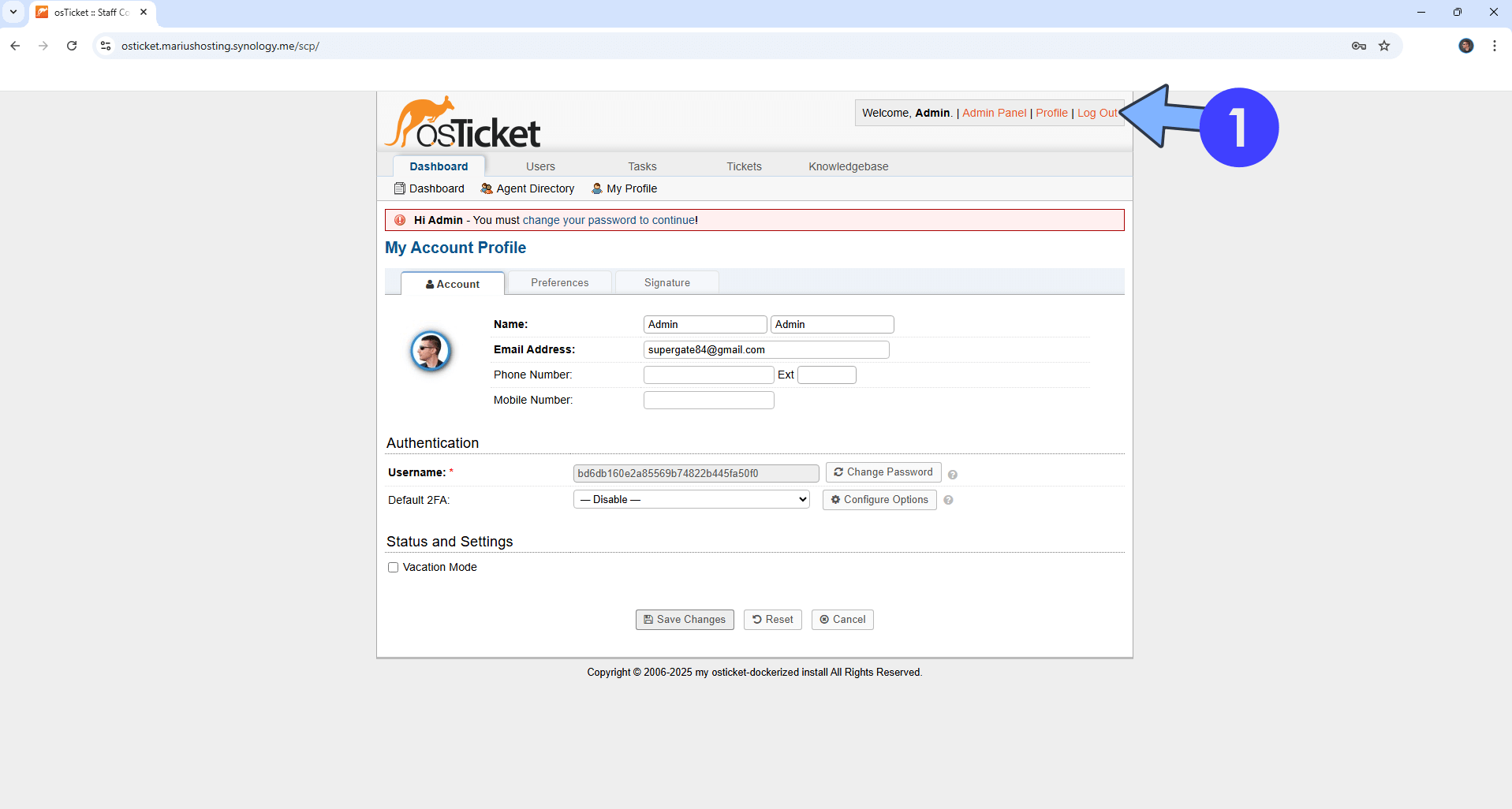
STEP 21
Type in your own Email address (OST_ADMIN_EMAIL) and the New Password that you have previously added at STEP 19. Click Log In. Follow the instructions in the image below.
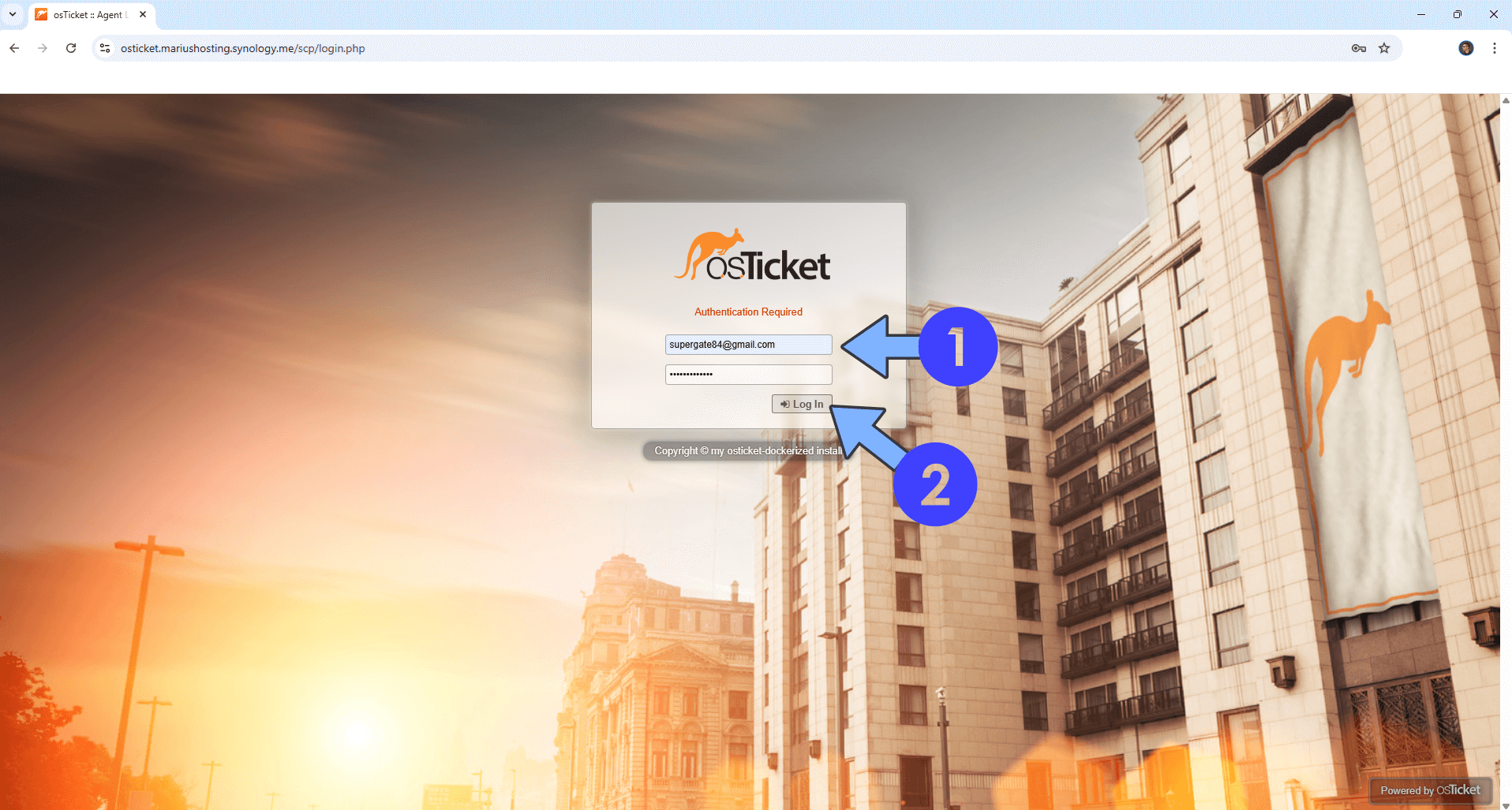
STEP 22
Click on Admin Panel / Settings tab / System tab. On the Helpdesk URL area, type in your own synology.me DDNS that you have previously created at STEP 6, with https:// at the beginning. Check Force HTTPS – Force all requests through HTTPS. Click Save Changes. Follow the instructions in the image below.
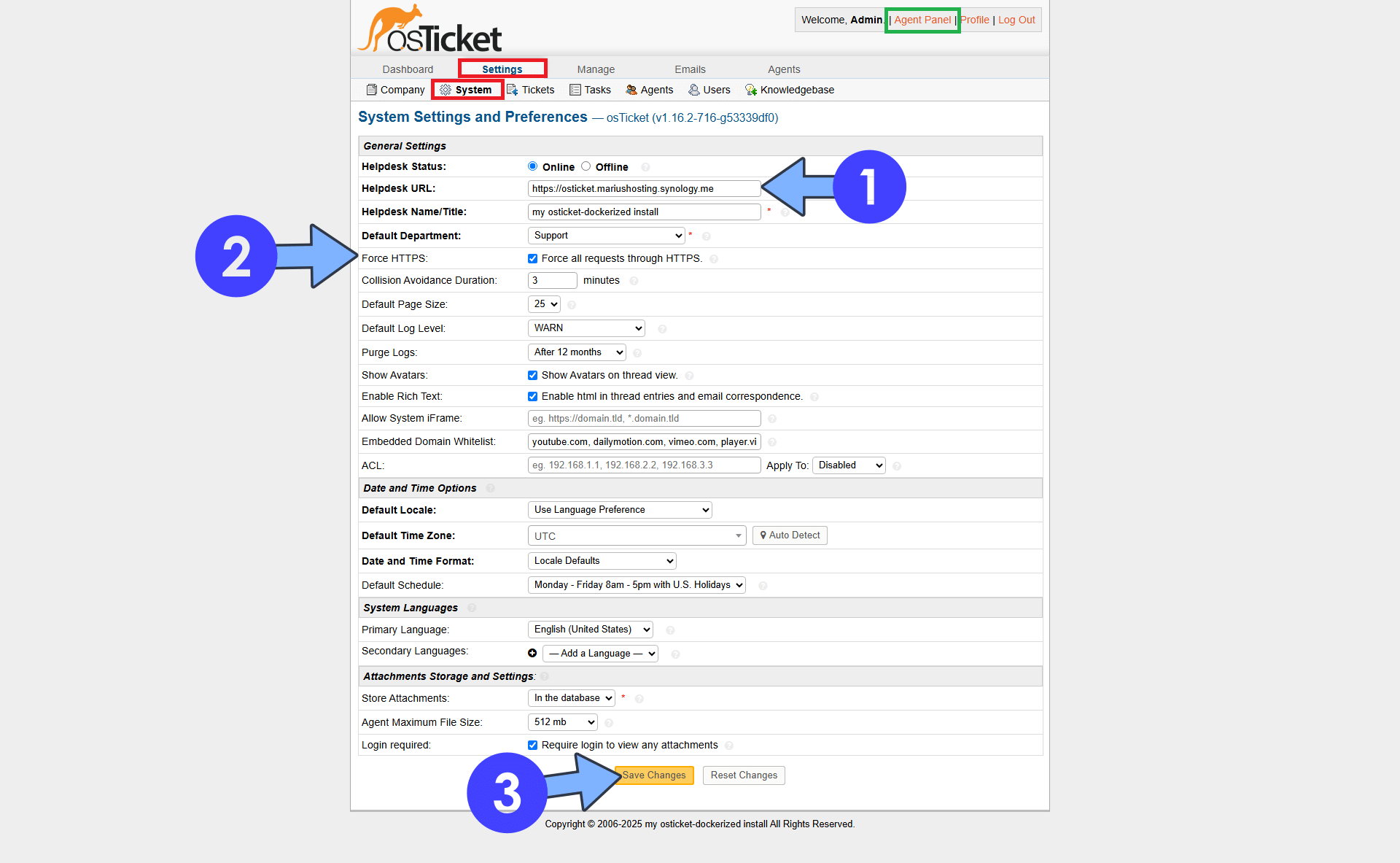
STEP 23
Your Support Center Helpdesk will be available at https://osticket.yourname.synology.me and your admin page will be available at https://osticket.yourname.synology.me/scp/login.php
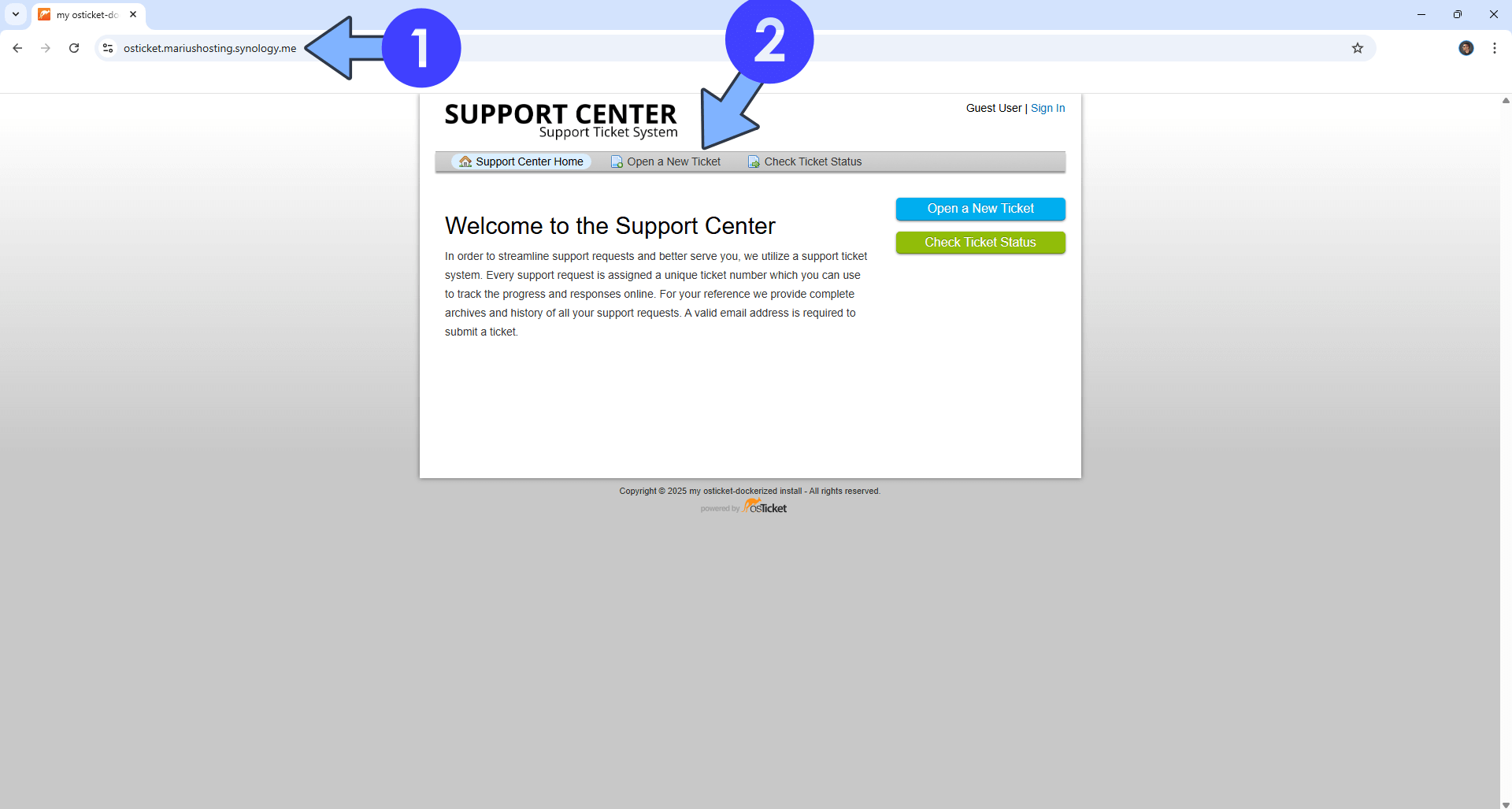
Enjoy osTicket!
If you encounter issues by using this container, make sure to check out the Common Docker issues article.
Note: Can I run Docker on my Synology NAS? See the supported models.
Note: How to Back Up Docker Containers on your Synology NAS.
Note: Find out how to update the osTicket container with the latest image.
Note: How to Free Disk Space on Your NAS if You Run Docker.
Note: How to Schedule Start & Stop For Docker Containers.
Note: How to Activate Email Notifications.
Note: How to Add Access Control Profile on Your NAS.
Note: How to Change Docker Containers Restart Policy.
Note: How to Use Docker Containers With VPN.
Note: Convert Docker Run Into Docker Compose.
Note: How to Clean Docker.
Note: How to Clean Docker Automatically.
Note: Best Practices When Using Docker and DDNS.
Note: Some Docker Containers Need WebSocket.
Note: Find out the Best NAS Models For Docker.
Note: Activate Gmail SMTP For Docker Containers.
This post was updated on Thursday / September 11th, 2025 at 3:10 PM
